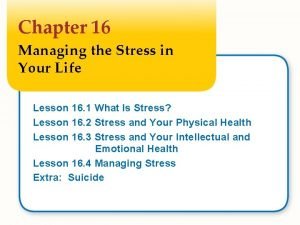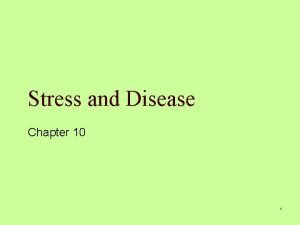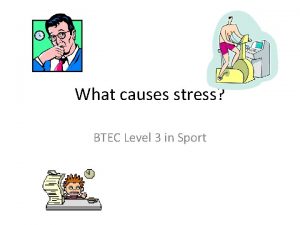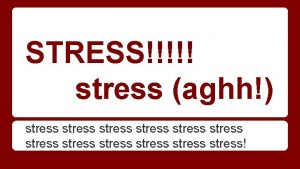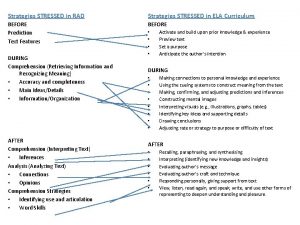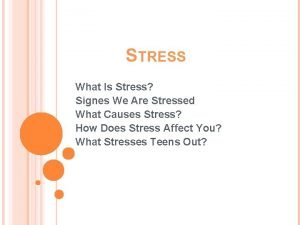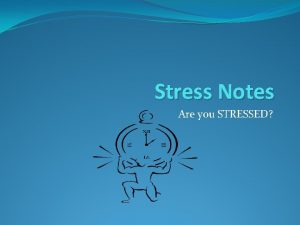STRESSED What causes stress in your life What









- Slides: 9

STRESSED? What causes stress in your life? What is stress?

Holmes and Rahe Stress Test for Teenagers • Let’s take the test. • Then you will score it and read about coping with stress. The Holmes and Rahe Stress Scale is well researched and its underlying theoretical basis has been widely confirmed and validated The scale is based on averages. We're all unique however, in the way stress affects us. Nobody is exactly average. The stress reaction to a particular life event varies greatly from one person to the next. The stress test for teenagers provides only a guide to your personal stress level and health risk. Its real value lies in going through the process and becoming more aware of the causes of stress in your life.

SCORE IT! • Your Stress Test Score: _______ • FIRST, take the weighting score and multiple it by the number of times in the last twelve months. • Add all of the scores together (1 -39).

WHAT DO THE SCORES MEAN? Remember: We're all unique however, in the way stress affects us. • Stress increases your risk of becoming sick. The higher your score in the stress test for teenagers, the greater your chance of experiencing illness or disease. • When your body is busy dealing with stress, it uses up resources you need for other body processes, especially your immune system. This makes you more vulnerable to becoming unwell, physically and mentally. • The stress test for teenagers will help you see how much you are at risk of sickness.

THE SCORES Research shows you should interpret your score on the stress test for teenagers as follows: • A score of 150 or less: Your stress score is low. This is a good result. It means your life currently is pretty stable - there's not much major change going on, and you have a low level of 'life event stress. ' This gives you a relatively low probability (about a 30% statistical chance) of developing a stress-related illness in the near future. • A score of 150 to 299: Your stress score is moderate. There is enough change going on in your life to cause you a fair bit of stress if you are not good at handling it. On average, you have a pretty much even probability (about a 50% statistical chance) of developing a stress-related disorder in the near future, unless you're good at handling change, or do something now to improve your ability to cope with stress. • A score of 300 or more: Your stress score is high. This could place you at considerable risk of developing a stressrelated disorder in the near future (about an 80% statistical chance). It means you probably will become ill, unless you are very good at handling stress, or do something now to improve your ability to cope with stress.

HANDOUT • READ THROUGH THE HANDOUT on your own. • ANSWER THE QUESTIONS at the end to yourself. • Then we will have FURTHER DISCUSSION "Adopting the right attitude can convert a negative stress into a positive one. ” -Hans Selye (Psychologist – Stress Pioneer)

DISCUSSION 1. What did you learn about your stress today? 2. Is stress always bad? Mostly it is how we HANDLE the stress in our lives that will make us or break us. 3. So what are some ways that work for you that may help others in the class? 4. What about senioritis? How can you manage it? "If you don't like something change it; if you can't change it, change the way you think about it. ” ~Mary Engelbreit Note: There will NOT be a e-portfolio entry for this lesson. Work Samples are explained on the next slide.

E-PORTFOLIO REQUIRMENT FOR SENIOR WORK SAMPLES DO FOUR of the following: Choose work that illustrates your progress along your college and career path. (Can only do each one 1 time): Take pictures of major (Senior Research Paper, Project Citizen, Senior Art/Photography work, Senior Recital information, etc. ) work done throughout the year (3 or more) ii. Attach files of important class/team work that illustrates your direction after school (3 or more) iii. Put grades on one page for your entire Senior year i. iv. Write about favorite class or least favorite class and explain what you learned about yourself (at least 2 pages). v. Write about what you learned this year in your classes (at least 2 pages) vi. Make a video about your Senior year classes (5 -10 minutes) vii. Make a video about the connections between your school work and the real world (optional : video, 2 page report, pictures with paragraphs) -VIDEOS MAY BE USED DURING YOUR SENIOR CULMINATING PROJECT

Stress test and Handout Sources: • Currie, K. (2010 -2012). Stress test for teenagers. Retrieved from http: //www. the 6 healthyhabits. com/stress-test 2. html • Palo Alto Medical Foundation. (2013). Managing your stress. Retrieved from http: //www. pamf. org/teen/life/stress/managestre ss. html • Quotes: About. com. Health Stress Management Understanding Stress Quotes - Inspirational, Funny, and Famous Stress Quotes
 Chapter 16 managing the stress in your life
Chapter 16 managing the stress in your life True fracture strain
True fracture strain Define axial stress
Define axial stress Chapter 10 stress responses and stress management
Chapter 10 stress responses and stress management Causes of stress in sports
Causes of stress in sports Which type of stress causes fault-block mountains?
Which type of stress causes fault-block mountains? Which type of stress causes fault-block mountains?
Which type of stress causes fault-block mountains? Proximate causation vs ultimate causation
Proximate causation vs ultimate causation Proximate causes vs ultimate causes
Proximate causes vs ultimate causes Enagic comp plan
Enagic comp plan
